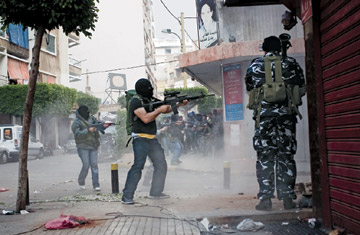
SHOOT-OUT IN WEST BEIRUT: Shi'ite gunmen from Hizballah and its ally Amal fire at Sunni positions. Their superior numbers and firepower helped the Shi'ite militias secure a quick victory
Surrounded by a ring of mountains like a concert band shell, Beirut has great acoustics. So the roiling street battles on May 8 between Hizballah militiamen and supporters of the Lebanese government echoed through the city with a drumroll of rocket explosions and a chorus of machine-gun fire that sounded like the symphonic overture to civil war. When an early-summer thunderstorm began that night, it seemed as if the heavens themselves were taking up the ominous theme.
But by the next morning, the battle for Beirut was mostly over. After just six hours of all-out fighting, Hizballah militants were in control of areas of West Beirut that had previously been the government's preserve. This made for some incongruous scenes. Bearded men with rifles and rocket launchers secured lingerie shops and a Starbucks in the commercial Hamra district. Elsewhere, they surrounded the houses of ministers and members of Parliament and watched buses evacuate students from the American University of Beirut. "It was like a field trip for us," said a Hizballah fighter standing on the Corniche, the city's seaside promenade. "Some [government loyalists] were begging us not to kill them. They were literally pissing in their pants."
Hizballah's victory was hardly a surprise. Its Shi'ite militiamen, who number in the thousands and are armed by Syria and Iran, have survived battle with the mighty Israeli army, while the supporters of Prime Minister Fouad Siniora's government are poorly armed amateurs on neighborhood patrol. Neither the police nor the military — which has received hundreds of millions of dollars in arms and training from the U.S. — dared to lift a finger against Hizballah. Long after the militiamen had withdrawn from the streets, the army said it would intervene in any ongoing clashes but added that it would not disarm Hizballah.
Despite the backing of the U.S., Western Europe and Arab states like Saudi Arabia, Siniora barely clings to power from his official residence and office in the Grand Serail, a former Turkish fortress surrounded by rings of barbed wire and riot police. But it is Hizballah's fire-breathing leader, Sheik Hassan Nasrallah, who's calling the shots.
Sounds familiar? Think of Iraq, where a U.S.-backed government is bunkered down in the Green Zone, fighting fitfully against Shi'ite militias. Or of Palestine, where despite U.S. support and aid, President Mahmoud Abbas is powerless against the Iran-backed Hamas in Gaza. When dealing with internecine Arab conflict, the Bush Administration has never been able to back the winning team; it invariably attaches unrealistic expectations to moderate parties and underestimates extremist groups. The lesson, says Bilal Saab, a Lebanon expert at the Brookings Institution, is that "you can't pick sides in a civil war."
Power Without Responsibility
Nasrallah unleashed his fighters on the streets of Beirut after the government tried to shut down Hizballah's private telecommunications network. But he has been spoiling for this fight since November 2006, when Shi'ite parties walked out of Siniora's coalition Cabinet. Although Lebanon is a democracy, the legitimacy of its government depends on a system of sectarian quotas; without the Shi'ites — the country's largest, fastest-growing group — the Prime Minister, a Sunni, has lacked both validity and street cred. The Shi'ites' price for returning: a greater share of power, including the right to veto major decisions. Siniora and other pro-U.S. members of his coalition have thus far refused, fearing among other things that such power would legitimize Hizballah's status as a state within a state.